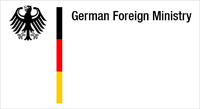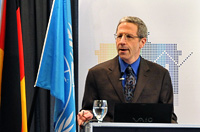The 2012 International Symposium on Cultural Diplomacy & International Economics
"Political & Economic Inequalities: Bridging the Gap between Civil Society and the Public & Private Sectors"

 The consequences of the recent financial crisis have reinforced the notion that the proceeds of growth do not distribute equally across all sectors of society and that economic growth on its own is not sufficient to shelter the most vulnerable groups of society from the vagaries of economic change. Subsequent action such as the Occupy Wall Street movement demonstrate a widespread dissatisfaction with sustained economic inequality and add urgency to the need to address inequality. It is arguable that the social contract is starting to unravel in many countries; there are deep-rooted social imbalances which need to be addressed if confidence is to be restored.
The consequences of the recent financial crisis have reinforced the notion that the proceeds of growth do not distribute equally across all sectors of society and that economic growth on its own is not sufficient to shelter the most vulnerable groups of society from the vagaries of economic change. Subsequent action such as the Occupy Wall Street movement demonstrate a widespread dissatisfaction with sustained economic inequality and add urgency to the need to address inequality. It is arguable that the social contract is starting to unravel in many countries; there are deep-rooted social imbalances which need to be addressed if confidence is to be restored. However, the problem is not one simply of the divide between the rich and the poor. Economic inequality is encouraged by political inequality and inequality of opportunity, both at the national and supranational level. The wealthy and powerful have greater access to politics and media and so are often in a position to communicate their views and interests more effectively than others; lobbying and campaign contributions can have a major impact on politics.
Increasingly, financial crises today are characterized by economic problems crossing the boundaries of nation states. Moreover, in today’s globalized world decisions made by politicians in one state can have serious effects for citizens of another state, even though the latter have no role in influencing the decisions in question. In other words, the territorial boundaries that specify who may participate in a democratic process are not necessarily equivalent to the populations affected. If the democratic ideal is maximum citizen participation, then there is reason to argue for a democratic deficit and thus political inequality at both the national and supranational level.

Symposium Speakers »
Speakers during the conference will include leading figures and experts from international politics & economics, academia, diplomacy, civil society and the private sector from across the world. These speakers will include a number of individuals from the ICD Advisory Board (for further information about the Advisory Board please click here).Symposium Participants »
Participation in the symposium is open to governmental & diplomatic officials, academics & scholars, economists, journalists, artists, civil society practitioners, private sector representatives, young professionals and students as well as other interested individuals from across the world.If you would like to reserve a position and participate in the symposium, please click on the "Apply Now" link below and fill out the online application form:
Certificate of Attendance
All participants will be awarded an official certificate of attendance upon completion of the program, which provides details about the speakers and topics at the conference. Each certificate will be signed by members of the ICD's Advisory Board.ICD Alumni Program »
All conference participants will be invited to join the ICD alumni program. The "ICD Alumni Group" is an international network of like-minded individuals with an interest in further developing the field of cultural diplomacy through the support of intercultural relations. Participation in the group is by invitation only, and is open only to individuals who have taken part in ICD programs. Members of the ICD Alumni Group will benefit from the following opportunities (more)Symposium Agenda »
The International Symposium on Cultural Diplomacy & International Economics will provide a forum to examine the factors contributing to economic and political inequality both on a global and a particularized scale, identify trends and propose solutions. Economic, political and cultural conditions leading to the development of the current situation will be assessed both at the national and supranational level, with a particular focus on the influence of corporations and powerful individuals, and the function of international organizations and the European Union as venues for decision-making beyond nation states.During the conference, the following themes and issues will be explored:
- Political and Economic Inequality in Society: An Historical Overview and Analysis of Contemporary Issues
- Developments and Trends in Political and Economic Inequality over the last 25 Years
- Solutions and Innovative Approaches to Tackling Economic Imbalances
- The Expanding Role of Corporate Social Responsibility in Society
































































































